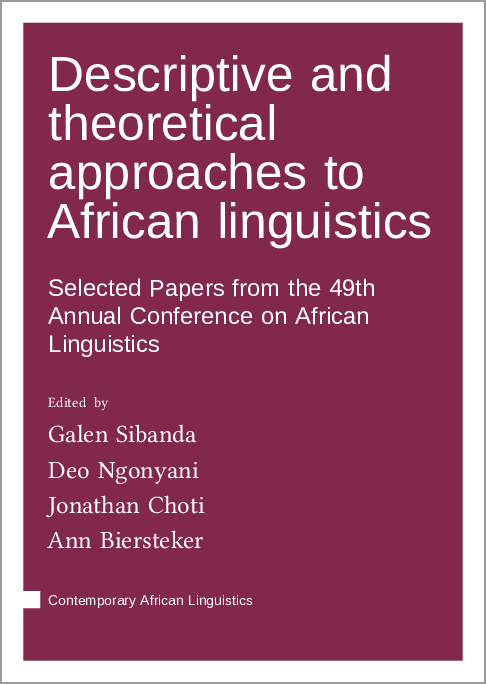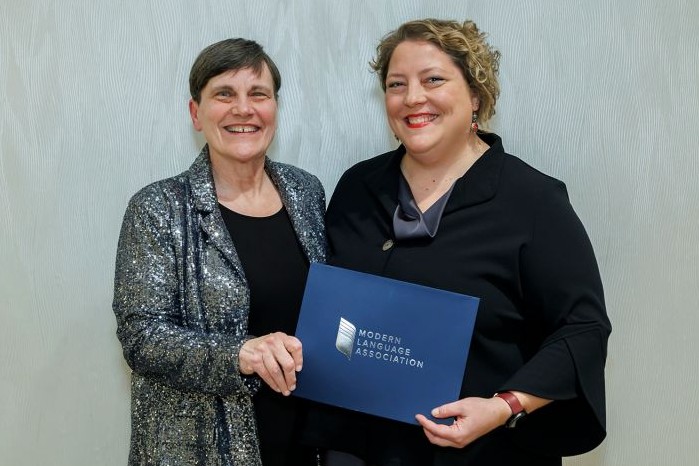
In September 2022, the Germany-based Language Science Press released a new book co-edited by Drs. Galen Sibanda, Deo Ngonyani, Jonathan Choti, and Ann Biersteker. Drs. Sibanda, Ngonyani, and Choti are faculty members in MSU’s Department of Linguistics, Languages, and Cultures while Dr. Biersteker, a prominent Swahili scholar, is a retired Associate Director of MSU’s African Studies Center. Titled Descriptive and Theoretical Approaches to African Linguistics: Selected Papers from the 49th Annual Conference on African Linguistics, the edited volume is an open educational resource (OER). This means that all 22 chapters of the book can be downloaded as pdf files through the link below at no cost. This is in accordance with the vision of Language Science Press, that is, “that all output of linguistic research is available to all people free of charge, regardless of their affiliation, the country they live in and the financial means they have”. You can access this book at the link below:
https://langsci-press.org/catalog/book/306
This book contains a selection of revised and peer-reviewed papers from the 49th Annual Conference on African Linguistics (ACAL49) that was hosted by the co-editors at Michigan State University on March 22-24, 2018. The conference was organized under the auspices of the Association of Contemporary African Linguistics, ACAL (https://acal.linguistlist.org/). Galen, Deo, and Jonathan are members of ACAL, and Jonathan served as a member of the ACAL Executive Board in 2016-19, and Galen is a current member of the Board. The book’s contributing authors include students and senior scholars from North America, Africa, and other parts of the world. The book chapters provide a glimpse into the breadth and quality of current research in African linguistics from both descriptive and theoretical perspectives. The fields covered range from phonetics, phonology, morphology, syntax, and semantics to sociolinguistics, historical linguistics, discourse analysis, language documentation, computational linguistics, and beyond. The articles reflect both the typological and genetic diversity of languages in Africa and the wide range of research areas normally covered by presenters at ACAL conferences.]
This volume contains a chapter by Dr. Choti and two chapters co-authored by Dr. Ngonyani. Choti’s chapter, “The Augment in Ekegusii and Haya”, examines a nominal prefix that precedes the noun class prefix in the internal structure of common nouns in many Bantu languages. Previous accounts of this prefix characterized it vaguely as an augment (also initial vowel, or pre-prefix). However, in his chapter, Choti concludes that the so-called augment is actually a bound article. He examined the behavior of the augment in Ekegusii (spoken in Kenya) and Haya (spoken in Tanzania).
In chapter 9, “A syntactic analysis of the co-occurrence of stative and passive in Kiswahili”, Yan Cong and Deo Ngonyani investigate the co-occurrence of Stative and Passive in Kiswahili. There are two readings of the stative extension in Kiswahili, that is, potential and resultative. The study accounts for the co-occurrence, the order of the suffixes, and the two interpretations of the stative.
The other chapter co-authored by Dr. Ngonyani is called: “Proto-Bantu reflexes in Dhaisu”. This work focuses on Dhaisu, a highly endangered Bantu language spoken in northeastern Tanzania. Seven vowels are reported in this study as has been in other studies /i, ɪ, ɛ, a, ɔ, ʊ, u/. However, the data show that the Dhaisu vowel system is changing to a 5-vowel system *i, *i, *e, *a, *o, *u, *u ̧ ̧ > /i, ɛ, a, ɔ, u/. The most remarkable feature of this change is that, unlike other Bantu languages, which merge the mid-high to high vowels, Dhaisu is merging the mid-high vowels to mid-low.
In sum, this book contains interesting articles that cover a wide range of topics in African languages and will attract a wide audience.
By Jonathan Choti



